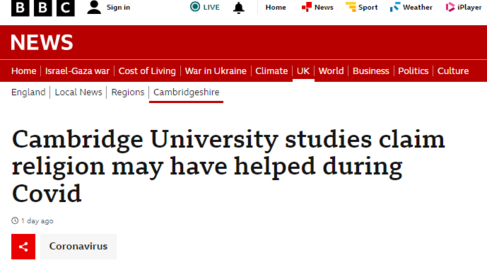
Cambridge research indicates the difference made by religion during the COVID-19 pandemic. Sriya Iyer, Professor of Economics and a member of the Cambridge Interfaith Research Forum, is co-author of two recently-released studies.
A Cambridge Working Paper in Economics, issued this week, draws information from nearly 4,000 UK residents surveyed during the first and second lockdowns. Do religious people cope better with this kind of large negative shock, the authors wondered. Self-reported data suggests that where someone’s religion is personally significant, it generally helped them cope better with restrictions. This was true for Christians, Muslims and Hindus, although the closure of places of worship had a disproportionate impact on religious Muslims and Catholics. This, the authors suggest, reflects the difficulty of fulfilling the expectation of weekly communal attendance.
Professor Iyer is also co-author of the journal article “Religion, Covid-19 and mental health” (European Economic Review 160, November 2023). The article reports findings from a USA study, where county-level data allowed the researchers to consider how diverse restrictions affected the beneficial impact of religiosity. In this case, the survey asked about incidence of Covid infections in respondents’ social networks, as well as eliciting responses about beliefs and practices and mental health. Employing a clinical scale used to measure depression, the researchers found that infections had a negative impact on mental health. This impact could be partially mitigated when people were able to participate in religious activities.
The research has been reported by the BBC and picked up in other media.
Further reading
Read the research publications
- “Religion, Covid-19 and mental health”—Girish Bahal (University of Western Australia), Sriya Iyer, Kishen Shastry, & Anand Shrivastava (Azim Premji University, India)
European Economic Review 160, November 2023 (via ScienceDirect.com) - “Do religious people cope better in a crisis? Evidence from the UK pandemic lockdowns”—Sriya Iyer, Shaun Larcom, & Po-Wen She
Cambridge Working Papers in Economics, January 2024 (via economics.cam.ac.uk, PDF)
Media reports
- “Cambridge University studies claim religion may have helped during Covid” (BBC News website report, via bbc.co.uk, 30 January 2024)
- “Religious people coped better with Covid-19 pandemic, research suggests” (University of Cambridge press release, 30 January 2024)
